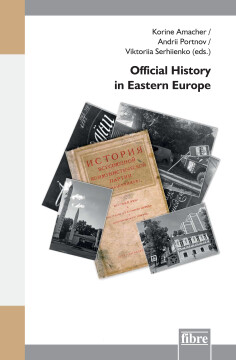Official History in Eastern Europe

BOOK
Cite BOOK
Style
Format
Official History in Eastern Europe
Editors: Amacher, Korine | Portnov, Andrii | Serhiienko, Viktoriia
Einzelveröffentlichungen des Deutschen Historischen Instituts Warschau, Vol. 40
(2021)
Additional Information
Book Details
Abstract
Unter »Official History« wird eine staatlich geförderte und ideologisch motivierte Auslegung der Vergangenheit verstanden, die politischen Zielen meist nicht-demokratischer Regime dient. Der optimistische Glaube, dies würde mit dem Zerfall der Sowjetunion ein Ende nehmen, stellte sich als naiv heraus. Pierre Nora behauptete, dass in den letzten 30 Jahren eine »allgemeine Politisierung von Geschichte« - die Ideologisierung der Arbeit von HistorikerInnen - beobachtet werden konnte.Wie wird die Arbeit von HistorikerInnen heute von den langjährigen Erfahrungen des 20. Jahrhunderts in Osteuropa beeinflusst? Was könnte eine »offizielle Geschichte« für staatenlose Nationen oder selbsternannte »Republiken« bedeuten? Wie wurde die ukrainische Geschichtswissenschaft sowjetisch oder ihr die Sowjetisierung auferzwungen? Welche Räume für individuelle Forschungsinitiativen oder sogar minimalsten Dissens mit den vorgeschriebenen Forschungsplänen wurden in den offiziellen Geschichtsinstitutionen der Sowjetunion und des sozialistischen Polens geboten? Wie wurden russische Geschichtsbücher in der postsowjetischen Zeit umgeschrieben? Welche Rolle spielen Literatur, Film, Denkmäler, Tourismus oder Rituale in der Geschichtspolitik? Wie wurde das Gedächtnis an den Zweiten Weltkrieg im gegenwärtigen russisch-ukrainischen Konflikt instrumentalisiert und wie beeinflussen die Bilder des Krieges im Donbas die geschichtspolitischen Debatten in benachbarten postsowjetischen Staaten?Diesen Fragen wird in den interdisziplinären Beiträgen dieses Bandes von ForscherInnen aus Österreich, Frankreich, Deutschland, Großbritannien, Litauen, Polen, der Schweiz und der Ukraine nachgegangen. Der Großteil der Artikel entstand im Rahmen des Forschungsprojektes »Divided Memories, Shared Memories. Ukraine/Russia/Poland (20th-21st centuries): An Entangled History« (gefördert durch den Schweizerischen Nationalfonds zur Förderung der wissenschaftlichen Forschung) an der Universität Genf und wurde erstmals im Juni 2018 auf der Konferenz »Official History in Eastern Europe. Transregional Perspectives« am Deutschen Historischen Institut in Warschau präsentiert.»Official history« is generally understood as state-sponsored and ideologically inclined construction of the past which serves certain political aims of mostly non-democratic regimes. The optimistic believes that it will end up with the collapse of the Soviet Union proved to be rather naive. As Pierre Nora argued, over the last thirty years we have experienced a »general politicization of history« - the process of transforming what historians produce into an ideology.How are the intellectual choices made by historians today influenced by the long twentieth-century experiences of Eastern Europe? What could »official history« mean for a stateless nation or a self-proclaimed »republic«? How did Ukrainian historiography become or how was it forced to become Soviet? What spaces for individual research initiatives or even for modest disagreement with obligatory planned research existed in the official history institutions of Soviet Ukraine and socialist Poland? How were Russian textbooks on history re-written during the post-Soviet years? What role do literature, film, monuments, holidays or rituals play in the politics of history? How have memories of the Second World War been instrumentalised in the ongoing Russian-Ukrainian conflict and how have images of the ongoing war in the Donbas influenced memory debates in neighbouring post-Soviet states?All those questions are reflected in the interdisciplinary contributions to the volume by scholars from Austria, France, Germany, Great Britain, Lithuania, Poland, Switzerland and Ukraine. The majority of research papers were developed within the research project Divided Memories, Shared Memories. Ukraine/Russia/Poland (20th-21st centuries): An Entangled History (supported by the Swiss National Science Foundation) at the University of Geneva, and were first presented at the conference Official History in Eastern Europe. Transregional Perspectives at the German Historical Institute Warsaw in June 2018.
Table of Contents
Chapters
‘Official History’ for a Stateless Nation
In: Official History in Eastern Europe (2021), pp. 15–37
How History Writing Became ‘Official’
In: Official History in Eastern Europe (2021), pp. 39–64
“To Reflect the History of the Party as It Was”
In: Official History in Eastern Europe (2021), pp. 65–86
Embedded Revisions?
In: Official History in Eastern Europe (2021), pp. 87–103
History Textbooks in Russia (1992–2019)
In: Official History in Eastern Europe (2021), pp. 105–132
Martyrs, Traitors, Healing Housewives
In: Official History in Eastern Europe (2021), pp. 135–149
The War in Neverland
In: Official History in Eastern Europe (2021), pp. 151–170
The Monumental Commemoration of St. Volodymyr / St. Vladimir in Ukraine, Russia, and Beyond
In: Official History in Eastern Europe (2021), pp. 173–217
Construction and Destruction
In: Official History in Eastern Europe (2021), pp. 219–236
Memory Culture and Memory Politics in Lithuania (1990–2018)
In: Official History in Eastern Europe (2021), pp. 237–264
World War II Memory Politics in Russia and Ukraine and Their Uses During the Conflict in the Donbas (Spring–Summer 2014)
In: Official History in Eastern Europe (2021), pp. 267–290
History as a Means of Hybrid Warfare?
In: Official History in Eastern Europe (2021), pp. 291–317
The Securitization of Entangled Historical Identity?
In: Official History in Eastern Europe (2021), pp. 319–347

















